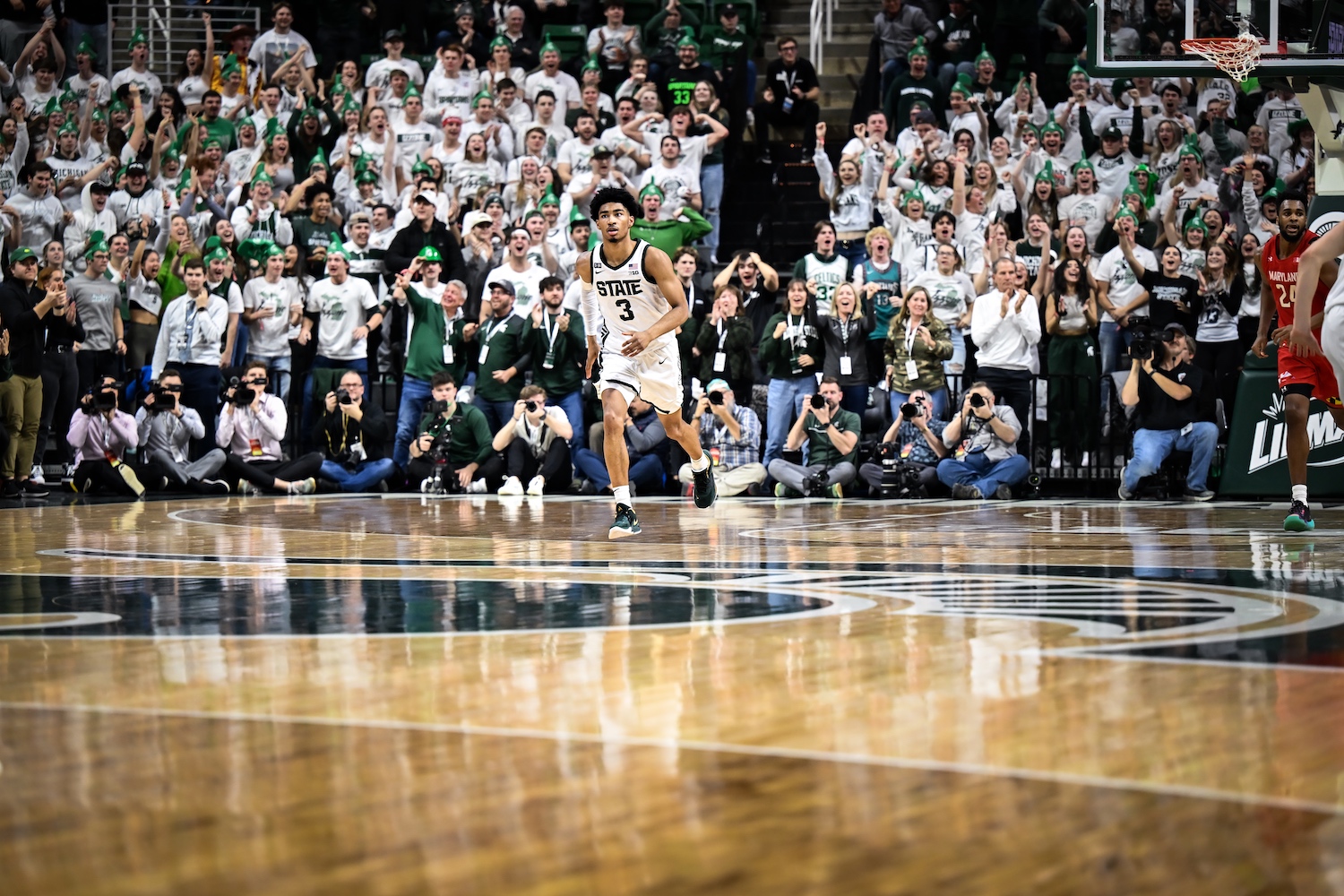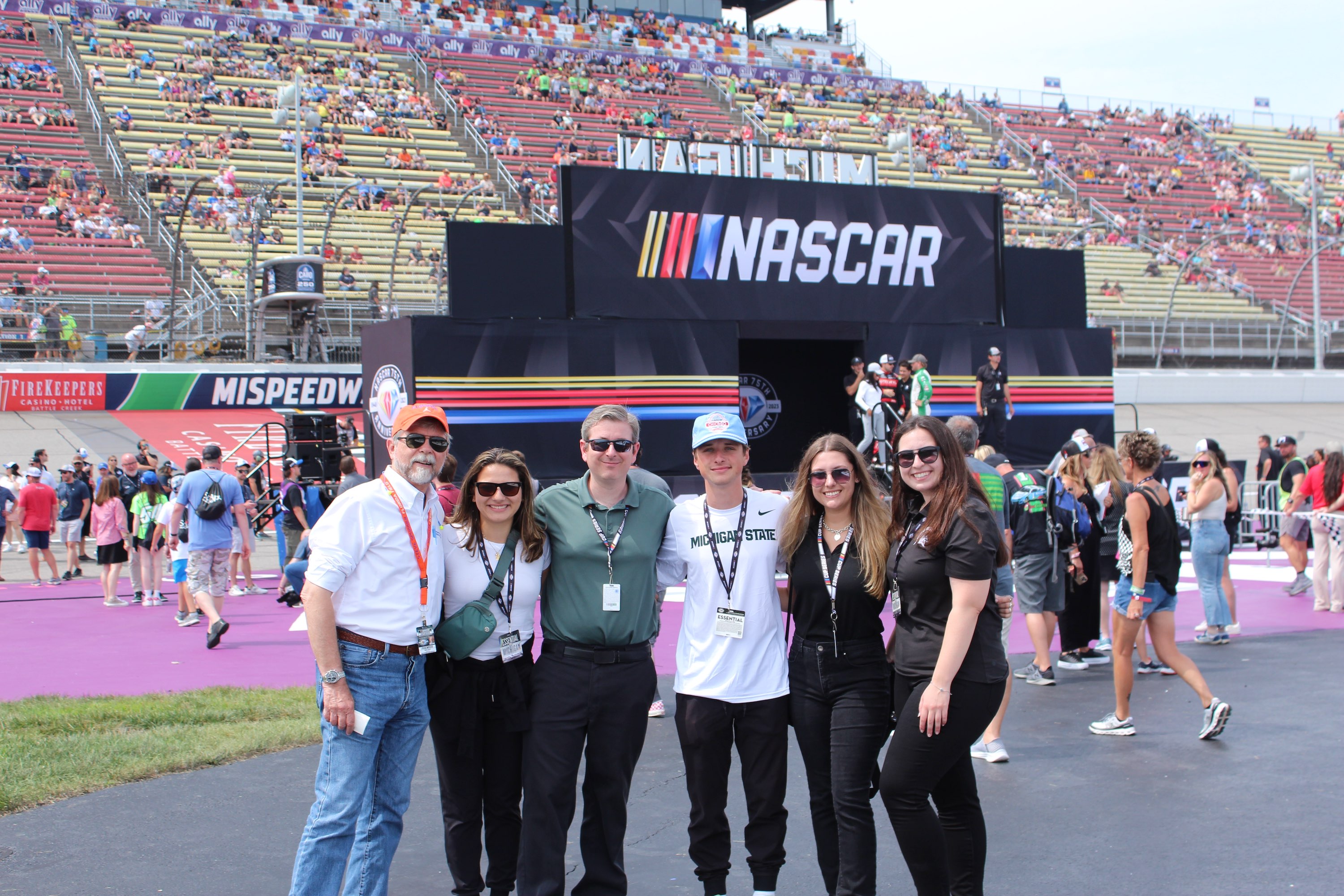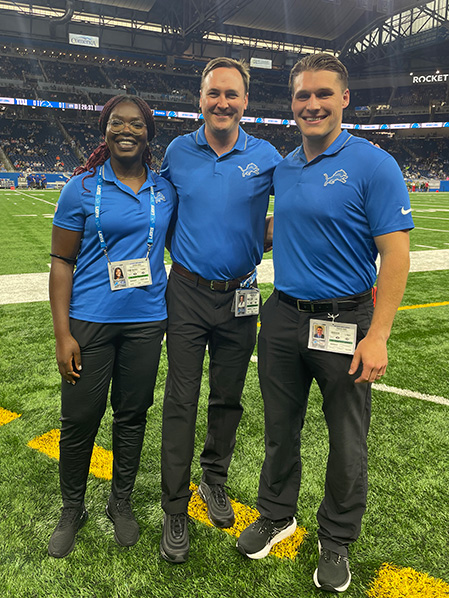The technology behind the wins
When Burghardt first began working with MSU Athletics as a graduate assistant while earning his master’s in kinesiology from 2009 to 2011, he worked as a member of the strength and conditioning teams for football and a variety of other sports at MSU. He loved the work and was eager to learn as much about the craft as possible — which, to him, meant looking at the science and technology behind it.
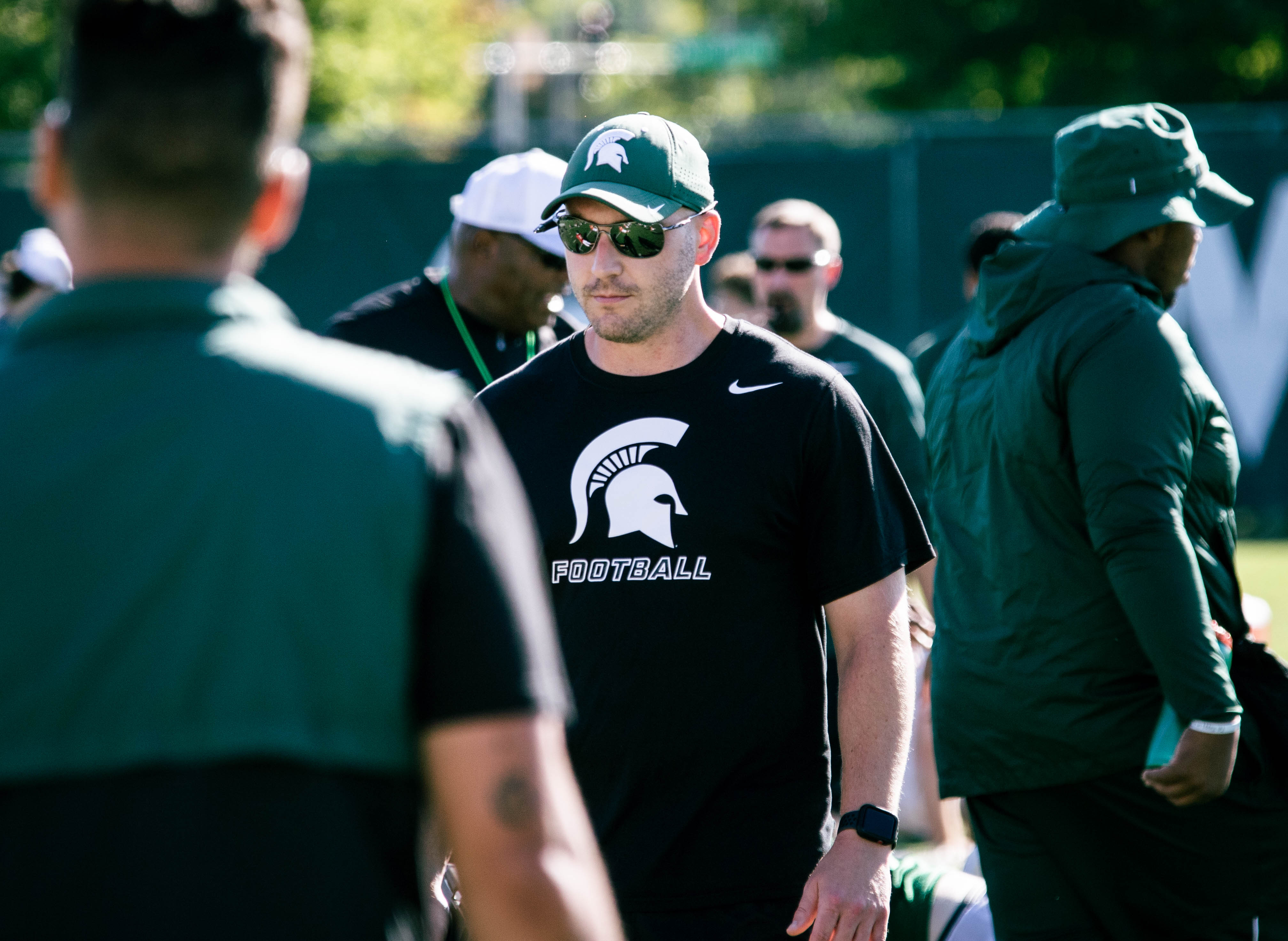
Bill Burghardt watches over MSU football practice. Photo by MSU Athletics
“I was looking at stressors for our athletes,” Burghardt says, “and I wanted to find solutions that would make it easier for us to understand what a student-athlete is going through.” After earning his master’s, he was hired as a strength and conditioning coach for the football team, and he continued searching for technology that would help him do his job better, which would in turn help the team on the gridiron.
In 2016, Burghardt and the football staff came across a device from Catapult Sports called the Catapult Vector — the same one the MSU men’s basketball team uses today. At that point, it was being used mostly by European soccer clubs, but for Burghardt, it was “the perfect marriage of sport, exercise physiology, strength and conditioning and technology.” By measuring things like how many times a player is tackled, how often they throw the ball, playing location (indoors or outdoors), acceleration, heart rate and more, athletics staff could learn so much about how a student-athlete was performing.
By 2018, Burghardt and the football team felt they were seeing a measurable benefit in using the technology and the data it returned. At the same time, Burghardt saw an opportunity to earn a doctorate in the Department of Kinesiology, which he achieved in 2021, in part thanks to the data from the tracking device. It was his third degree from MSU.
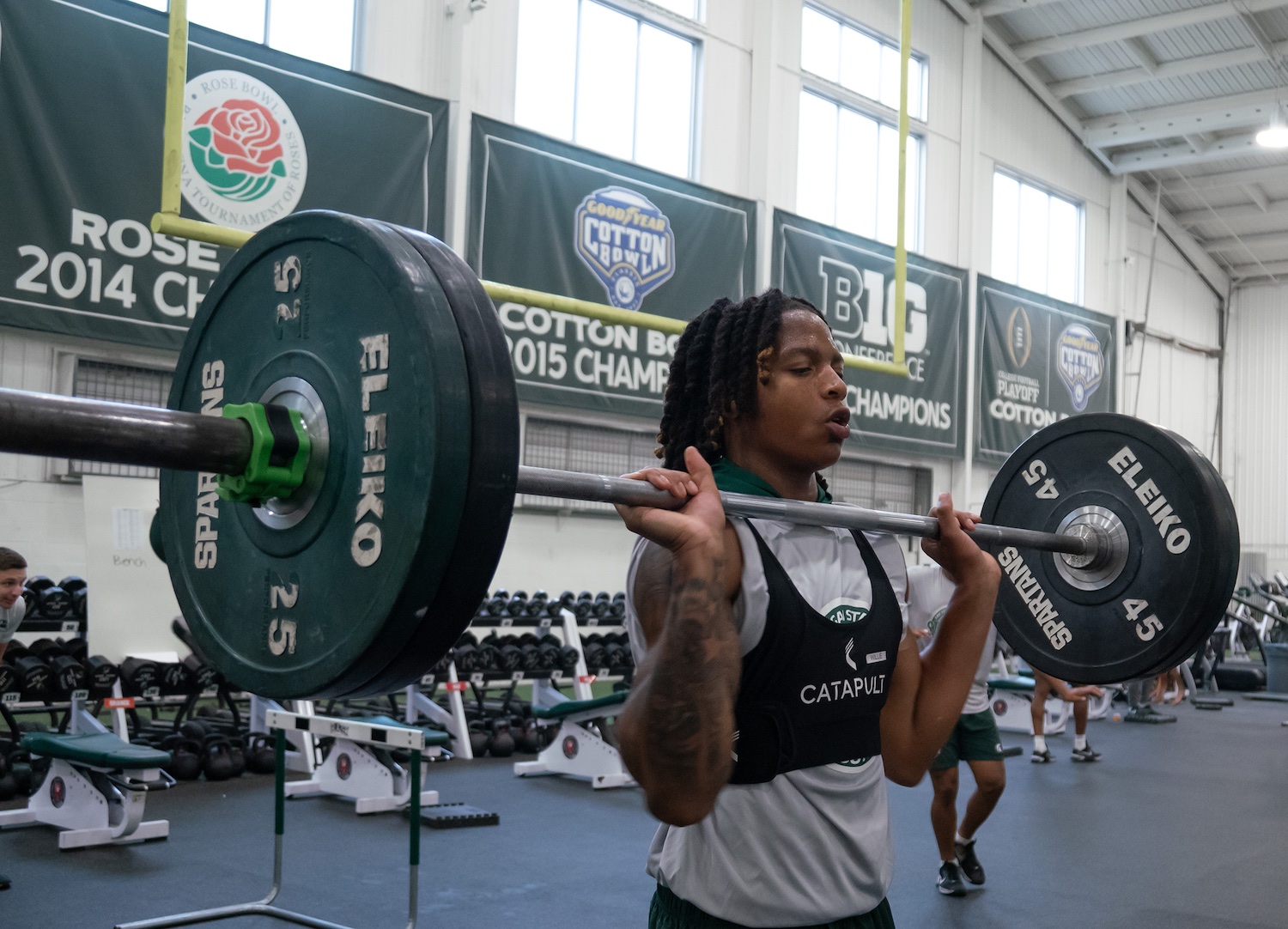
Ade Willie trains in a Catapult tracking device. Photo by MSU Athletics
After taking on the role of director of football sports science in 2020, he was elevated to director of sports science for all MSU Athletics the next year. Today, he’s building a team that’s working with devices like Catapult for teams across Spartan sports. In fact, eight teams now wear the tracking devices in preparation for competition. Football, men’s and women’s basketball, volleyball, ice hockey, field hockey, men’s soccer and women’s soccer — which just won its second consecutive Big Ten Championship this fall — are all working with the MSU sports science team to reach the top of their game.
Work in sports science is not limited to the athletics department. Burghardt is happy to partner with departments and researchers across campus, including with his colleague Albert Cohen, who leads the sports analytics graduate certificate program at MSU. There’s more to sports science at MSU than analytics and exercise physiology — the mental side of the sport is critical, too.
Researchers in the College of Communications Arts and Sciences, for example, are working with the NCAA to address the stigma surrounding mental health in student athletics.
Taking care of athletes’ minds
Bree Holtz, an associate professor in the Department of Advertising and Public Relations, has a background in information communication technologies and health communication and studies how they can improve health. Holtz believes there is an opportunity to find ways to reach young people struggling with mental health via an app.

Bree Holtz. Courtesy photo
So, when a researcher from the University of Alabama reached out to Holtz about the impact of mental health on student-athletes, she was interested in learning more. “They’re young adults going through the same issues and problems that their peers are,” Holtz says, “but it can sometimes seem more heightened because they have more stress on their day with practice and competitions.” Together, Holtz and the Alabama team applied for and received a grant from the NCAA to understand the mental health pressures student-athletes face and the barriers they encounter when trying to access support.
Their project, “Interactive Narratives for Mental Health: Sharing Stories of Success,” was awarded a $25,000 grant from the NCAA for its annual NCAA Innovations in Research and Practice Grant Program, which aims to fund research teams who conduct studies that enhance student-athletes' psychosocial well-being. Research began in June 2023, and come next June, Holtz is hoping to have a finished product.
That finished product would be a serious game that could be accessed through an app that would enable student-athletes to seek help. A serious game is similar to a choose-your-own-adventure book, but in this case, it would simulate situations or problems a student-athlete may face. With the creation of these serious games, the research team hopes to see an improvement in the ways conversations and behaviors around mental health are approached in sports communities, reducing pressures student-athletes deal with on a day-to-day basis.
To help craft the games, Holtz gathered student-athletes from both MSU and Alabama in focus groups. Together, the groups worked on storyboards and drawings that worked through the situations that might affect student-athletes.
Spartans are busy at work on youth sports and the mental health side of sport, too. Professor Emeritus Dan Gould, who served as the former director of the Institute for the Study of Youth Sports, which is over 40 years old, was inducted to the International Society for Sports Psychology Hall of Fame in 2023. MSU Athletics has a staff devoted to student-athlete wellness, as well.
One thing Holtz noted was that there are resources at MSU and in the athletics department for student-athletes, but the stigma of asking for help can remain a barrier. As she continues working with her colleagues at the University of Alabama during the year-long grant to develop a serious game, she has been grateful for the support from MSU Athletics.
“Without the collaboration, guidance, and resources provided by Ashton Henderson (executive associate athletic director), Alan Haller (athletic director) and Ebony Clark (deputy athletic director), this achievement would not have been possible,” Holtz says. “Their commitment to the well-being of student-athletes has been instrumental in shaping our project and ensuring its success.”
Collaboration between departments is not new at MSU. In fact, that willingness to work together is having a national impact in sports beyond the collegiate playing field.
